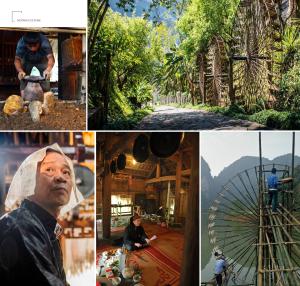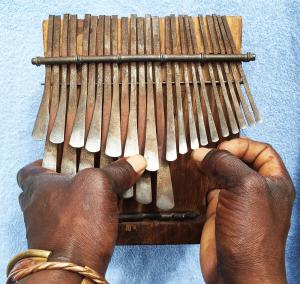Gbofe of Afounkaha holds deep cultural and social significance in Cote d'Ivoire. It serves as a powerful medium for communication, conveying messages of praise, love, satire, mourning, and moral or educational teachings during various rituals and traditional ceremonies. Gbofe plays a vital role in conferring respect for the holders of tradition, fostering cultural unity, peace, and social cohesion among different communities and people. Additionally, it represents a crucial part of the cultural identity of the Tagbana community, preserving their historical narratives, values, and artistic expressions across generations.
04-04-2022
| Institutional and human capacities | Established in 2004, the Association for the Safeguarding of the Music of the Transverse Trumps of Côte d'Ivoire (ASMT-CI) is a non-governmental organization dedicated to preserving and promoting the Gbofe tradition. Despite operating under the Ministry of Culture, their efforts appear to be constrained. Additionally, a UNESCO contract with the Cote d'Ivoire National Commission for UNESCO in 2013 aimed at safeguarding the Gbofe was terminated due to failure to submit the nomination file within the set time frame, yet discussions on this matter persist, highlighting the urgent need for more comprehensive efforts to ensure the transmission of Gbofe to the younger generations as a vital aspect of their cultural identity. | |
| Transmission and education | The Gbofe has the function of education, for youth in particular since this traditional knowledge is most often passed down from father to son, but also other young talents can also join in the training sessions. | |
| Inventorying and research | Yegnan Touré G Angeline's dedicated research and promotion of the Gbofe of Afounkaha, the music of the transverse trumpets of the Tagbana community, led to its recognition as an intangible heritage of humanity by UNESCO in 2008. Her master's thesis on this subject, completed after her graduation from INSAAC and Félix Houphouët Boigny University, was instrumental in the proclamation of the Gbofe as a "Masterpiece of the Oral and Intangible Heritage of Humanity" by UNESCO in 2001. At the national level, her research revitalized the practice of Gbofe, leading to its resurgence not only in the village of Afounkaha but also across the Hambol region of Cote d'Ivoire, thereby fostering the development of various related crafts. | |
| Policies as well as legal and administrative measures | The Association for the Safeguarding of the Music of the Transverse Trumpets of Côte d'Ivoire (ASMT-CI), formed in 2004, is a non-governmental organization dedicated to preserving and promoting Gbofe, operating under the oversight of the Ministry of Culture, yet its impact appears to be constrained. | |
| Role of intangible cultural heritage and its safeguarding in society | Gbofe, a traditional music form accompanied by the transverse trumpets called Afounkaha, serves diverse functions in Tagbana society, conveying messages of praise, love, satire, mourning, and moral or educational teachings during rituals and traditional ceremonies. It upholds the holders of tradition, fosters cultural unity, peace, and social cohesion among communities, and its performers typically undergo an apprenticeship. Originally reserved for elites, Gbofe is used for celebrating significant events such as marriages, baptisms, and funerals, often honoring authorities and esteemed figures within the community. | |
| Awareness raising | The Ministry of Culture (MOC) in Cote d'Ivoire promotes the role of intangible cultural heritage by providing financial assistance to community associations and NGOs engaged in cultural preservation activities, and through the Fonds de soutien à la culture et à la création artistique (FSCCA) that aids dance festivals. Awareness initiatives involve celebrating Heritage Days and festivals, as well as organizing commemorative events during regional festivals like the International Mother Tongue Language Day. | |
| Engagement of communities, groups and individuals as well as other stakeholders | The various Gbofe performers follow an apprenticeship. It is also used for celebration such us marriages, baptisms and funerals, but usually for authorities or great personalities. For it is formerly a sacred dance, a music reserved for the elites. The players are most often notables or important people of the community. | |
| International engagement | In 2013, a contract was established between UNESCO and the Cote d'Ivoire National Commission for UNESCO for the implementation of a safeguarding project, which was later canceled due to the failure to submit the required nomination file within the designated timeframe. However, efforts persist in addressing the importance of preserving Gbofe as part of the cultural identity, emphasizing the need for continued endeavors to ensure that younger generations are aware of and connected to this aspect of their heritage. | |
| References |
|
|

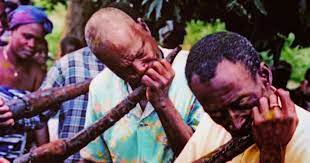





.jpeg)
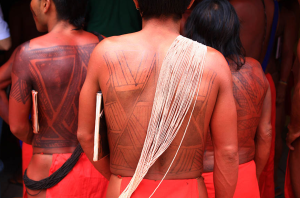
.jpg)
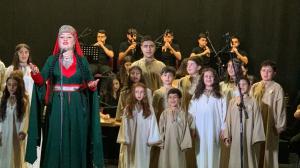


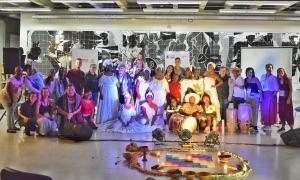
.png)
.jpg)















_(31711258567).jpg)

















